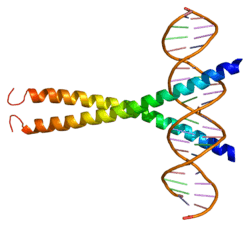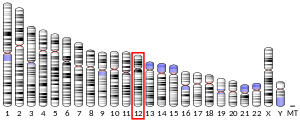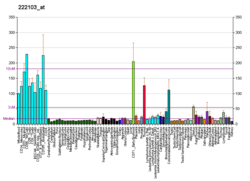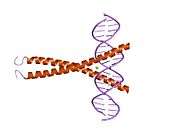ATF1
Cyclic AMP-dependent transcription factor ATF-1 is a protein that in humans is encoded by the ATF1 gene.
This gene encodes an activating transcription factor, which belongs to the ATF subfamily and bZIP (basic-region leucine zipper) family. It influences cellular physiologic processes by regulating the expression of downstream target genes, which are related to growth, survival, and other cellular activities. This protein is phosphorylated at serine 63 in its kinase-inducible domain by serine/threonine kinases, cAMP-dependent protein kinase A, calmodulin-dependent protein kinase I/II, mitogen- and stress-activated protein kinase and cyclin-dependent kinase 3 (cdk-3). Its phosphorylation enhances its transactivation and transcriptional activities, and enhances cell transformation.[4]
Clinical significance
Fusion of this gene and FUS on chromosome 16 or EWSR1 on chromosome 22 induced by translocation generates chimeric proteins in angiomatoid fibrous histiocytoma and clear cell sarcoma. This gene has a pseudogene on chromosome 6.[4][5]
See also
References
- GRCh38: Ensembl release 89: ENSG00000123268 - Ensembl, May 2017
- "Human PubMed Reference:". National Center for Biotechnology Information, U.S. National Library of Medicine.
- "Mouse PubMed Reference:". National Center for Biotechnology Information, U.S. National Library of Medicine.
- "Entrez Gene: ATF1 activating transcription factor 1".
- Zucman J, Delattre O, Desmaze C, Epstein AL, Stenman G, Speleman F, Fletchers CD, Aurias A, Thomas G (November 1993). "EWS and ATF-1 gene fusion induced by t(12;22) translocation in malignant melanoma of soft parts". Nat Genet. 4 (4): 341–5. doi:10.1038/ng0893-341. PMID 8401579.
- Houvras Y, Benezra M, Zhang H, Manfredi JJ, Weber BL, Licht JD (November 2000). "BRCA1 physically and functionally interacts with ATF1". J. Biol. Chem. 275 (46): 36230–7. doi:10.1074/jbc.M002539200. PMID 10945975.
- Yamaguchi Y, Wada T, Suzuki F, Takagi T, Hasegawa J, Handa H (August 1998). "Casein kinase II interacts with the bZIP domains of several transcription factors". Nucleic Acids Res. 26 (16): 3854–61. doi:10.1093/nar/26.16.3854. PMC 147779. PMID 9685505.
- Fujimura Y, Ohno T, Siddique H, Lee L, Rao VN, Reddy ES (January 1996). "The EWS-ATF-1 gene involved in malignant melanoma of soft parts with t(12;22) chromosome translocation, encodes a constitutive transcriptional activator". Oncogene. 12 (1): 159–67. PMID 8552387.
Further reading
- Fujimura Y, Ohno T, Siddique H, Lee L, Rao VN, Reddy ES (January 1996). "The EWS-ATF-1 gene involved in malignant melanoma of soft parts with t(12;22) chromosome translocation, encodes a constitutive transcriptional activator". Oncogene. 12 (1): 159–67. PMID 8552387.
- Fujimura Y, Siddique H, Lee L, Rao VN, Reddy ES (October 2001). "EWS-ATF-1 chimeric protein in soft tissue clear cell sarcoma associates with CREB-binding protein and interferes with p53-mediated trans-activation function". Oncogene. 20 (46): 6653–9. doi:10.1038/sj.onc.1204684. PMID 11709699.
- Rehfuss RP, Walton KM, Loriaux MM, Goodman RH (1991). "The cAMP-regulated enhancer-binding protein ATF-1 activates transcription in response to cAMP-dependent protein kinase A.". J. Biol. Chem. 266 (28): 18431–4. PMID 1655749.
- Yoshimura T, Fujisawa J, Yoshida M (1990). "Multiple cDNA clones encoding nuclear proteins that bind to the tax-dependent enhancer of HTLV-1: all contain a leucine zipper structure and basic amino acid domain". EMBO J. 9 (8): 2537–42. PMC 552284. PMID 2196176.
- Hai TW, Liu F, Coukos WJ, Green MR (1990). "Transcription factor ATF cDNA clones: an extensive family of leucine zipper proteins able to selectively form DNA-binding heterodimers". Genes Dev. 3 (12B): 2083–90. doi:10.1101/gad.3.12b.2083. PMID 2516827.
- Pongubala JM, Atchison ML (1995). "Activating transcription factor 1 and cyclic AMP response element modulator can modulate the activity of the immunoglobulin kappa 3' enhancer". J. Biol. Chem. 270 (17): 10304–13. doi:10.1074/jbc.270.17.10304. PMID 7730336.
- Liu F, Thompson MA, Wagner S, et al. (1993). "Activating transcription factor-1 can mediate Ca(2+)- and cAMP-inducible transcriptional activation". J. Biol. Chem. 268 (9): 6714–20. PMID 8384217.
- Dorsey MJ, Tae HJ, Sollenberger KG, et al. (1996). "B-ATF: a novel human bZIP protein that associates with members of the AP-1 transcription factor family". Oncogene. 11 (11): 2255–65. PMID 8570175.
- Sun P, Lou L, Maurer RA (1996). "Regulation of activating transcription factor-1 and the cAMP response element-binding protein by Ca2+/calmodulin-dependent protein kinases type I, II, and IV". J. Biol. Chem. 271 (6): 3066–73. doi:10.1074/jbc.271.6.3066. PMID 8621702.
- Shimomura A, Ogawa Y, Kitani T, et al. (1996). "Calmodulin-dependent protein kinase II potentiates transcriptional activation through activating transcription factor 1 but not cAMP response element-binding protein". J. Biol. Chem. 271 (30): 17957–60. doi:10.1074/jbc.271.30.17957. PMID 8663317.
- Bonaldo MF, Lennon G, Soares MB (1997). "Normalization and subtraction: two approaches to facilitate gene discovery". Genome Res. 6 (9): 791–806. doi:10.1101/gr.6.9.791. PMID 8889548.
- Kobayashi M, Shimomura A, Hagiwara M, Kawakami K (1997). "Phosphorylation of ATF-1 enhances its DNA binding and transcription of the Na,K-ATPase alpha 1 subunit gene promoter". Nucleic Acids Res. 25 (4): 877–82. doi:10.1093/nar/25.4.877. PMC 146500. PMID 9016641.
- Soubt MK, Marksitzer R, Menoud PA, Nagamine Y (1998). "Role of tissue-specific transcription factor LFB3 in a cyclic AMP-responsive enhancer of the urokinase-type plasminogen activator gene in LLC-PK1 cells". Mol. Cell. Biol. 18 (8): 4698–706. PMC 109056. PMID 9671480.
- Yamaguchi Y, Wada T, Suzuki F, et al. (1998). "Casein kinase II interacts with the bZIP domains of several transcription factors". Nucleic Acids Res. 26 (16): 3854–61. doi:10.1093/nar/26.16.3854. PMC 147779. PMID 9685505.
- Pellín A, Monteagudo C, López-Ginés C, et al. (1999). "New type of chimeric fusion product between the EWS and ATFI genes in clear cell sarcoma (malignant melanoma of soft parts)". Genes Chromosomes Cancer. 23 (4): 358–60. doi:10.1002/(SICI)1098-2264(199812)23:4<358::AID-GCC11>3.0.CO;2-3. PMID 9824209.
- Kabe Y, Goto M, Shima D, et al. (1999). "The role of human MBF1 as a transcriptional coactivator". J. Biol. Chem. 274 (48): 34196–202. doi:10.1074/jbc.274.48.34196. PMID 10567391.
- Sawada J, Simizu N, Suzuki F, et al. (2000). "Synergistic transcriptional activation by hGABP and select members of the activation transcription factor/cAMP response element-binding protein family". J. Biol. Chem. 274 (50): 35475–82. doi:10.1074/jbc.274.50.35475. PMID 10585419.
- Houvras Y, Benezra M, Zhang H, et al. (2000). "BRCA1 physically and functionally interacts with ATF1". J. Biol. Chem. 275 (46): 36230–7. doi:10.1074/jbc.M002539200. PMID 10945975.
- Knöfler M, Saleh L, Bauer S, et al. (2000). "Promoter elements and transcription factors involved in differentiation-dependent human chorionic gonadotrophin-alpha messenger ribonucleic acid expression of term villous trophoblasts". Endocrinology. 141 (10): 3737–48. doi:10.1210/en.141.10.3737. PMID 11014230.
- Arthur JS, Cohen P (2000). "MSK1 is required for CREB phosphorylation in response to mitogens in mouse embryonic stem cells". FEBS Lett. 482 (1–2): 44–8. doi:10.1016/S0014-5793(00)02031-7. PMID 11018520.
- Andreucci JJ, Grant D, Cox DM, et al. (2002). "Composition and function of AP-1 transcription complexes during muscle cell differentiation". J. Biol. Chem. 277 (19): 16426–32. doi:10.1074/jbc.M110891200. PMID 11877423.
External links
- ATF1+protein,+human at the US National Library of Medicine Medical Subject Headings (MeSH)
- Human ATF1 genome location and ATF1 gene details page in the UCSC Genome Browser.
This article incorporates text from the United States National Library of Medicine, which is in the public domain.
- Shimomura A, Ogawa Y, Kitani T, Fujisawa H, Hagiwara M (July 1996). "Calmodulin-dependent protein kinase II potentiates transcriptional activation through activating transcription factor 1 but not cAMP response element-binding protein". J. Biol. Chem. 271 (30): 17957–60. doi:10.1074/jbc.271.30.17957. PMID 8663317.




